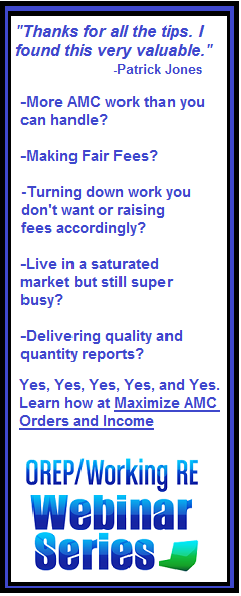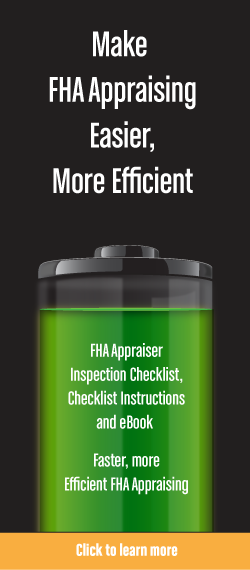
|
Published by OREP, E&O Insurance Experts | Dec. 21, 2011 | Vol. 240 |

|
> Surveys
> Blogs
> Leave Comments Below |
Customary and reasonable appraisal fees, a concept originated by HUD, can
only be determined by accurately defining what a customary and reasonable
assignment is, as determined by a local, experienced appraiser.
Editor’s Note: As another eventful year winds down, appraiser Andy Anderson looks ahead at fixing a now broken appraisal profession. Wishing you and yours a warm holiday season and a healthy and prosperous New Year! Merry Christmas.
Customary and Reasonable Fees
By Andy Anderson
The appraisal profession was not broken. Just like other professions,
there were (and are) some bad actors, but appraising was not broken and should
have been allowed to do its job correctly. That is not what happened during the
unrealistic property value increases of the lender-created real estate bubble
and it is not what is happening today. Here’s how to fix it.
Appraisal fees for an independent appraiser should not be directed or controlled by anyone except the independent fee appraiser responsible for determining the scope of work necessary to complete the assignment in a competent and credible manner.
Customary and reasonable appraisal fees, a concept originated by HUD, can only be determined by accurately defining what a customary and reasonable assignment is, as determined by a local, experienced appraiser. Each and every assignment can require a different level of education, experience and competence to complete in a professional manner, dictated by many factors, including but not limited to location, population, market activity, data availability and the complexity of the property and improvements.
Each and every assignment requires the adequate time necessary to complete the
request in a diligent and competent manner. The turn time of the report should
not be dictated in a manner that compromises the appraisal, resulting in a less
than credible assignment conclusion. In compliance with Title XI FIRREA of
1989, and again with Title XIV of 2010, the appraiser is responsible, per the
Uniform Standards of Appraisal Practice (USPAP), to determine the necessary
scope of work to produce credible results- not a client and not an AMC. While
lender and client requirements need to be met, the final determination rests
with the appraiser.
2. Professional vs. Industry Appraisers
There are substantial differences between a professional appraiser
and what I call industry appraisers. The professional appraiser
provides a service to the client that goes beyond the ability to fill out a form
and complete the requirement for an appraisal to be included in the lender’s
loan package. All “other than lender/AMC” users of valuation services desire
diligent, accurate and professionally-completed and credible valuation results.
They seek out and compensate professional appraisers for their
expertise and allow adequate time necessary to produce supportable, defendable
and credible results. While there are many professional appraisers who feel they
are “stuck” providing services to major banks, lenders and AMCs to stay in
business, the professional appraiser does not compromise the quality and
diligence because of low fees and turn time requirements. That is professional
integrity.
In contrast, many appraisers were and are providing a product that is dictated
and controlled by lenders and AMCs to cosmetically appear to adhere to federal
regulations; the very regulations that require the lender to include an
appraisal report in the loan package. The lending industry is the only user of
appraisal services who desires fast and cheap appraisal reports and has come to
rely primarily on a certain segment of appraisers to provide them. These
appraisers- industry appraisers, are expected to complete diligent
property inspections, competent research and analysis and credible and reliable
results in less than adequate time: often 48 hours or less. And they do. Many
appraisers who work for less than adequate compensation were taught by
supervisors who provided unfair fee splits during training. Many industry
appraisers were improperly trained by supervisors who went so far as to lie
about hours and experience on the trainee’s experience logs to capitalize on the
opportunity to make a fast buck in the real estate bubble. The real estate
crisis was fueled by greed. Some of these appraisers feel like they were done a
great disservice by their “mentors” and have told me they would like to learn
how to become professional appraisers.
Third party service providers became a primary source for fast and cheap
appraisals during the recent real estate bubble in an effort for more and faster
profits. AMCs are utilizing industry appraisers in many cases. The result
for consumers is lower quality appraisals with no cost savings. The
public has not seen any savings since the fees charged by the third-party
providers are similar or higher than what professional appraisers charge
in the same geographical area. The low quality of appraisals can be confirmed by
the thousands of loan packages and appraisal reports being reviewed daily by the
GSEs, banks and lenders, which are proving to be less than reliable, credible
and acceptable. The general public deserves the protection of completely
ethical, unbiased and uncompromised appraisal reports.
3. Free Market
In an effort to protect the consumer and the investor the professional
appraiser must be allowed to openly compete with other professional
appraisers in a given market area. That AMCs are able to dictate fees and turn
times, that only industry appraisers are willing to accept, results in a
disservice to the public and investor. The appraisers who are required to sign
contract agreements and fee schedules dictated by AMCs are being treated as
though they are employees of the AMC and not independent fee appraisers. Many of
the professional appraisers who will not sign AMC agreements are slowly
but surely going out of business.
4. Protecting the Public: Transparency
The consumer should never be charged more for the appraisal report than the
professional appraiser is paid to complete the report. It is not the
consumer or the appraiser’s responsibility to pay for the cost of locating and
engaging a competent appraiser, and the inclusion of a credible appraisal report
in a loan package. Given this, a true “customary and reasonable” fee would be
the fee charged to the buyer.
The HUD One should only reflect actual fees and charges paid to the appraiser
under the title of “Appraisal Fees.” Any third party fees and charges should
appear on the HUD One separately and be clearly identified for the consumer to
understand.
The government, lenders and AMCs do not have the authority to dictate what fees
and charges are acceptable and will result in services that are in the best
interests of the public and the financial security of our families, communities
and our nation. Paying a dictated and mandatory customary and reasonable fee
does not ensure the public that only competent and diligent appraisers are
completing their appraisals. The fact that an appraiser is Licensed or
Certified does not by itself assure the client or consumer that the
appraiser has the adequate education, experience and ability to complete the
assignment correctly or at an equal level with other licensed and certified
appraisers in the same geographical market.
The focus needs to be the protection of the public. It is time to educate the
public to the fact that the appraisal fee they are charged by most lenders is
NOT what the appraiser is paid to complete the appraisal report. If I am
charged $500 for an appraisal, I expect to get a $500 appraiser. So does the
public.
5. Customary and Reasonable Fees?
The Dodd-Frank Financial Reform Bill said that Licensed and Certified real
estate appraisers shall be compensated at customary and reasonable fees for
appraisal reports completed for federally regulated transactions. Yet, a legally
enforceable definition of “customary and reasonable” has not been determined. I
am not sure this is possible. “Customary and Reasonable” is arguably one of the
most ill-conceived notions in the Financial Reform Bill, though there are many.
Professional appraisers know what usual and customary charges are for real
estate appraisal services in their area and should be able to command adequate
and outlined fees in the free market. “Customary and Reasonable” fees are only
necessary to determine profit margins for third party servicers. Precedence has
been set in the medical and dental fields to determine customary and reasonable
fees to be paid by a third party, such as an insurance company. Customary and
reasonable fees have been determined by establishing the usual and customary
charges of medical professionals located in a given market area.
Usual and customary charges in the medical field are defined as follows:
1. Fee that is the most consistently charged by physicians for a particular
procedure.
2. Fee that is usual for a particular procedure charged by the majority
of physicians with similar training and experience within the same geographic
area.
Usual and customary charges for the professional appraiser might read as
follows:
1. The fee that is the most consistently charged by the professional,
independent, appraiser for a particular appraisal assignment.
2. Fee that is usual for a specific and particular appraisal assignment
charged by the majority of appraisers with similar training and experience
within the same geographic area.
VA/FHA Fees
Conventional, VA and FHA appraisal assignments have distinctly different
inspection, reporting and knowledge requirements. FHA appraisal charges should
be higher than VA appraisal fees when the FHA-required inspection and report are
completed accurately and competently. VA fees, while closer to actual usual and
customary fees for FHA appraisal assignments, are not acceptable to set minimal
or mandatory fees for conventional appraisal assignments. VA fees have been set
by surveying the usual and customary charges by the appraisers on the VA panel
and take into consideration all of the VA requirements that need to be learned
and adhered to by the VA appraisers, including the willingness to accept complex
assignments at the same compensation as the less-complicated assignments.
Accepting VA fees and becoming a VA Appraiser is a business decision; similar to
the banks having fee panel appraisers that would accept slightly less per
appraisal for volume. Also, the veteran-buyer is never charged more than the VA
appraiser is paid for the completion of the appraisal report.
What Appraisers Can Do
The decision to accept less than adequate compensation and to complete a
report in less time than is acceptable, to adhere to unrealistic turn times
dictated by AMCs and lenders, are business decisions. When an appraiser accepts
compensation and turn times that are less than adequate, that appraiser has made
a statement to the client and the industry that those fees and turn times are
“customary and reasonable” for that appraiser. Not for me. To date I have not
signed a single AMC agreement or contract. The only AMC orders I have completed
were compensated at my determined charges and my turn times as determined on a
case by case basis, based on the complexity of the assignment. Approximately
30-40 percent of my appraisal work is “other than lender”* and that percentage
is growing.
The appraisal profession was not broken, but it is now. It will require
diligence and dedication to rebuild what has always been the most important part
of home buying: a completely unbiased and uncompromised real estate appraisal,
completed by ethical and experienced real estate appraisers, to determine a
credible and reliable property value at the time of purchase or refinance.
About the Author
Mr. Anderson has been a professional, independent appraiser for 27 years,
specializing in complex, mountain, agricultural and manufactured housing, expert
witness for value and construction, insurance appraisals, probate, estate/tax
appraisals, etc. He is a VA, FHA, Cal Vet approved fee panel appraiser. He is
an author and instructor for appraiser Continuing Education and has been known
to mentor any appraiser requesting his assistance.
*OREP/Working RE's Webinar Series: Mr. Anderson will be conducting
webinars on various topics in 2012, including the first: Diversify:
Cultivating other than Lending Work. The webinar schedule will be announced
early next month.
Previous Stories by Andy Anderson:
UMDP/UAD: Road to Ruin?
Open Letter to Feds, Banks, Citizens/Taxpayers (Part 1)
ATTENTION: You are receiving WRE Online News because you opted in at WorkingRE.com or purchased E&O insurance from OREP. WRE Online News Edition provides news-oriented content twice a month. The content for WRE Special Offer Editions is provided by paid sponsors. If you no longer wish to receive these emails from Working RE, please use the link found at the bottom of this newsletter to be removed from our mailing list.



